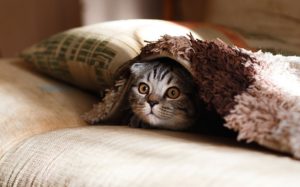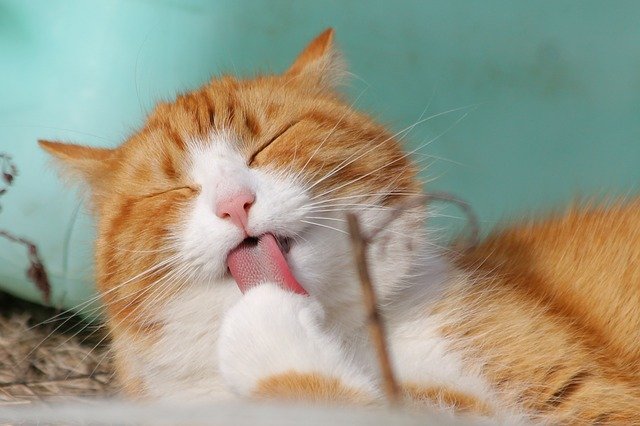Why Does My Cat Over Groom?
Over grooming in cats is pretty common and can be a frustrating situation for us cat partners as well as for your fur ball. It can be difficult to get to the bottom of it, and there’s usually no easy solution. There are a couple of different general categories as to why this may happen and different approaches to helping with each. Sometimes you’ll encounter both. Be sure to work with your vet as you’re trying to figure it out. Broadly the causes are usually Medical, meaning something like allergies are happening, or Behavioral, called “psychogenic alopecia” with stress being the main motivator. Let’s look at some characteristics of the two, and some helpful advice for Why does my cat over groom?
Medical Causes for cat overgrooming
 Usually medical indications for cat over grooming are what you’d expect – something that makes her itch, so she’s using grooming to relieve some of that discomfort. One of the most common reasons for itchiness is allergies. Cat’s can have allergies to food, fleas, or lots of other things in their environment. If she starts to groom more than usual, or you’re noticing missing patches of fur, or she’s chewed the length down, check for evidence of fleas, or look around and consider if there have been major changes in her environment or changes in the foods she’s eating. Your vet can look for flea evidence if you’re not comfortable, and can also rule out allergies with some testing. With positive allergic results, a veterinary dermatologist will usually look at steroid or anti-histamines as possible treatment for relief.
Usually medical indications for cat over grooming are what you’d expect – something that makes her itch, so she’s using grooming to relieve some of that discomfort. One of the most common reasons for itchiness is allergies. Cat’s can have allergies to food, fleas, or lots of other things in their environment. If she starts to groom more than usual, or you’re noticing missing patches of fur, or she’s chewed the length down, check for evidence of fleas, or look around and consider if there have been major changes in her environment or changes in the foods she’s eating. Your vet can look for flea evidence if you’re not comfortable, and can also rule out allergies with some testing. With positive allergic results, a veterinary dermatologist will usually look at steroid or anti-histamines as possible treatment for relief.
Another cause of itchiness in cats can be some kind of infection like skin mites or fungus like ringworm. Though less common in indoor-only cats, it shouldn’t be ruled out as a cause, so your vet will probably need to do a skin scrape procedure and fungal cultures to investigate further.
Some cats will also develop secondary issues as a result of over grooming, trauma to the skin, which causes them to lick even more, really compounding the problem. Think about it when you get a skin reaction like poison ivy, and it itches, so you scratch it, and sometimes so much you cause injury, and maybe lesions, that, although in the same area, weren’t directly caused by the poison ivy. It can be a vicious circle, and the same can happen with your kitty.
Another cause of over grooming in cats can be related to joint discomfort, arthritis, or even something like a bladder infection. Clues may be a focus on a single joint on their body, or concentration on a particular area, rather than several areas. Closely monitoring their grooming routines should give you more insight.
Whatever the medical reason for over grooming, if it is medical, it’s super important to work closely with your vet to get to the bottom of it to avoid prolonging and introducing additional infection or stressors.
Behavioral Causes for cat overgrooming
 So, you’ve ruled out medical causes for your cat over grooming? Maybe it’s time to look into stress related grooming or psychogenic alopecia. This is an obsessive compulsive behavior where your kitty just can’t stop licking or chewing themselves. This behavior releases endorphins that make them happy, so it becomes pleasurable and relaxing, and much like the same response humans have to endorphins, once they get a good reaction, they continue to the point of compulsion.
So, you’ve ruled out medical causes for your cat over grooming? Maybe it’s time to look into stress related grooming or psychogenic alopecia. This is an obsessive compulsive behavior where your kitty just can’t stop licking or chewing themselves. This behavior releases endorphins that make them happy, so it becomes pleasurable and relaxing, and much like the same response humans have to endorphins, once they get a good reaction, they continue to the point of compulsion.
There are lots of stressors that affect cats, and the more sensitive yours is, the more things that don’t seem to be that big a deal may impact their behavior. Changes in their environment such as new furniture, rearranging furniture, moving to a new home, etc. can all be factors. And again, a really laid back cat may have no issues adapting to these types of changes, where one more skittish or sensitive can be more easily affected by minor changes.
Has your home become more hectic lately and the over grooming just started? A new member of the family like a new baby can be a big stressor for cats, especially when he’s been the baby of the family for some time. Maybe it’s a house full of guests over for an extended stay. A new cat or dog entering the home? Depending on your cat’s personality, these can affect her in different ways. And there’s always the risk of a short term response to a temporary stressor can result in a longer term compulsive behavior, so it’s really important to try to address causes.
Cat’s with psychogenic alopecia often focus on plucking or grooming from the inner thighs, bellies or along their front legs. It can happen with any cat, but particularly those that are more high strung. Often their grooming is at night where you aren’t watching so its easy to assume his hair is just falling out. Please don’t punish your kitty for the behavior though, we don’t want to introduce yet another cause of stress.
It’s important to try to identify and remove the stressor, which is often easier said than done, but try to observe as much as you can to help you determine what it could be. Obviously if you’ve changed her diet recently or introduced another fur baby, that might be an indicator, but take your time to think about changes that may be happening, and remove or mitigate those if possible.
Some final thoughts on cat overgrooming
Medical causes for cat overgrooming can typically be treated or managed following your vet’s treatment recommendations. That’s the good news, but also important that you get these medical issues under control so the behavior doesn’t go on so long that the behavior crosses over to something more compulsive.
Behavioral causes for cat overgrooming can be much more difficult to get under control. We’ve experienced this behavior with Romeo over the years, and while he isn’t particularly high strung by any means and we’ve lived in the same home since he was adopted as a kitten, we are a kitten foster family so we usually have a litter of kittens at home for several weeks at a time throughout the year. We call him Uncle Romey, as he usually interacts as a mentor with them, but often wonder if this parade of kittens has some negative impact on him. We’ve learned that the behavioral condition can be a life long issue, the condition comes and goes, and may even require anti-depressants or anxiety meds, but we just continue to love him and provide a really good environment, with lots of stimulation and “outdoor” time out in the lanai.
We hope this helps you learn more about over grooming in cats and welcome your thoughts below. Tell us what you’ve tried, what’s worked, what challenges you’re maybe still facing. We’d love to hear about your kitty and share some pictures as well on our Featured Friends page.

